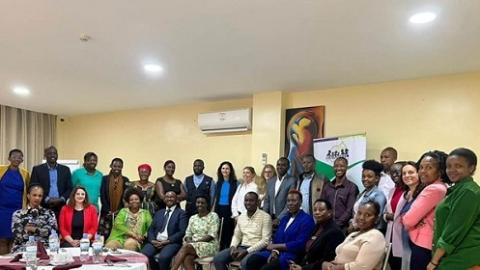What is the future of UN peace operations?

Dr Georgina Holmes, Lecturer in Politics and International Studies and her colleague Dr David Curran, Associate Professor in the Centre for or Trust, Peace and Social Relations, Coventry University, published in a blog reflecting on the future direction of UN peacekeeping. The blog explores how peace operations might evolve in light of the changing geopolitical environment, pressure from within the UN to adapt and the rising influence of regional actors in the conflict prevention and resolution space. The blog is based on discussions from a two-day hybrid conference hosted by POLIS on 20 and 21 February 2023, which was attended by 50 scholars and practitioners from universities and institutes around the world. The conference was funded by the Centre for Global Challenges and Social Justice and the British International Studies Association.
POLIS gender expertise informs the UK’s Defence Command Paper
Between March and May 2023, Dr Georgina Holmes, Lecturer in Politics and International Studies, was invited to take part in a consultation on the newly published Integrated Review Refresh 2023: Responding to a more contested and volatile world, a policy document setting out how the UK will respond to global security concerns. The consultation informed the development of the next Defence Command Paper. Dr Holmes was then invited to attend a policy review meeting hosted by the Ministry of Defence on the development of the Defence Command Paper, which is due to be published this summer.
Visit to Rwanda to share research findings on transforming militarised masculinities
In January 2023, Dr Georgina Holmes returned to Kigali, Rwanda to share her research findings on men and women’s experiences of peacekeeping training and deploying to UN missions. While she was there, Dr Holmes gave a briefing at the Ministry of Defence and a guest lecture at the Centre for Gender, National University of Rwanda, where previously she had been a visiting lecturer. She also gave a briefing to 30 trainers at GAKO Military Training Academy, and a 2-hour briefing to staff in the Ministry of Gender on how the British Army is trying to change ideas about what it means to be a male soldier so that men stop discriminating against and harassing women in their ranks.
Policymakers in Rwanda’s Ministry of Gender said that the briefing Dr Holmes provided would help inform their new Men Engage Strategy. Dr Holmes also talked about the need to end violence and bullying against men in the military and military training and support soldier mental health initiatives, as both can be pathways to domestic violence, and good practice was discussed. Dr Holmes said, “It was great to be able to disseminate the same messages about transforming militarised masculinities to academia, the NGO community, the Ministry of Gender and the Ministry of Defence in Rwanda and I look forward to seeing how their Men Engage Strategy is implemented over the next few years”.
Image: Dr Georgina Holmes with members of Rwandan civil society at a gender café organised by RWAMREC, a Rwandan NGO specialising in transforming masculinities. (Copyright: Georgina Holmes)
Request your prospectus
![]()
Explore our qualifications and courses by requesting one of our prospectuses today.
